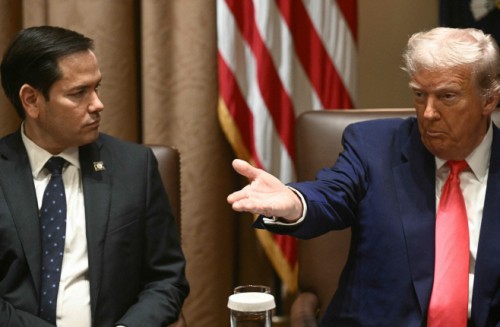 |
| U.S. President Donald Trump (right) speaks during a Cabinet meeting at the White House in Washington, D.C., on April 10, as Secretary of State Marco Rubio looks on. / Source: AFP-Yonhap News |
The escalating tariff war between the United States and China is throwing global trade into turmoil and pushing the world economy closer to a potential recession.
This latest trade conflict far surpasses the dispute triggered by President Donald Trump during his first term from 2018 to 2019. Back then, Trump imposed tariffs on Chinese goods over a span of 14 months. In contrast, the current measures have come in rapid succession, with significantly higher tariffs applied across a broader range of products in just a matter of days.
On April 9, Trump announced additional tariffs after China retaliated with matching 50% duties in response to earlier U.S. tariffs. As a result, the total U.S. tariff rate on Chinese imports now stands at 145%, not the previously stated 125%, according to U.S. media. This includes a 20% penalty imposed in February targeting Chinese fentanyl—an illicit drug dubbed the "zombie narcotic."
In retaliation, China announced on April 11 that it would immediately limit imports of Hollywood films.
For the past 30 years, China has allowed the import of 10 Hollywood movies annually. However, the National Film Administration in Beijing stated on its official website that it would "follow market principles and respect audience preferences" while "appropriately reducing" the number of U.S. films permitted for distribution.
Analysts believe the move is unlikely to severely impact Hollywood, as Chinese films have increasingly dominated domestic box office sales in recent years, overtaking American productions.
Nonetheless, the escalating trade war threatens to severely damage U.S.-China relations—once considered the backbone of global economic growth. Disruptions in direct and indirect trade between the two nations could have cascading effects on the entire global trade system.
Trump’s unexpected decision to pause retaliatory tariffs against most countries—excluding China—has been interpreted as a sign of growing concern over the U.S. economy. At the same time, it signals a strategic shift toward focusing pressure on Beijing while maintaining a hardline stance.
The U.S. is reportedly seeking to isolate China diplomatically by forging more favorable trade deals with Asian and other countries. The suspension of non-China tariffs may support this broader strategic goal.
Most Read
-
1
-
2
-
3
-
4
-
5
-
6
-
7





















